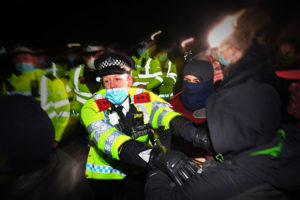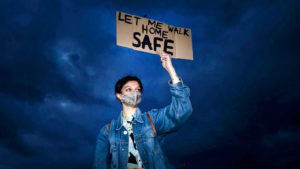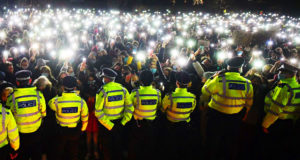It is quite some time since the Metropolitan Police Commissioner, Dame Cressida Dick, attracted positive headlines. Exactly five years since her appointment was announced in February 2017, she presides over a force mired in scandal.
Dick promised to make tackling violent crime her priority but the figures tell a very different story: recorded rapes have soared, domestic violence is rising and last year saw the highest ever level of teenage homicides in London (30, compared with 17 in 2020). Last March a vigil for Sarah Everard, raped and murdered by a serving officer, was a PR disaster for the Met, while Dick was forced to defend policing at the Euros 2020 final in July after scenes of violent disorder at Wembley.
The force is currently the subject of two inquiries, one ordered by Dick and the other, announced only a day later, by the Home Secretary, Priti Patel. The latter announcement was hardly a vote of confidence in the review ordered by Dick since both inquiries were prompted by the abduction of Ms Everard. Last week the Met was hit by another round of terrible publicity as a toxic culture of misogyny, racism and homophobia was exposed by the Independent Office for Police Conduct at Charing Cross police station in central London.
The Mayor of London, Sadiq Khan, was said to be “furious” and reported to have put the Commissioner “on notice”. What took him so long? His volte face came only five months after Patel offered Dick an extension to her term without so much as a squeak of protest from Khan. Patel apparently believed that the extension would provide “continuity”, although it’s hard to imagine many Londoners welcoming a continuation of the disasters that have taken place under Dick’s watch.
By the time she was granted an extra two years in September last year, the scandals accumulating around the Met were becoming impossible to ignore. PC Wayne Couzens had been accused of indecent exposure on at least two occasions, the most recent just three days before he murdered Ms Everard, but he wasn’t suspended and was able to use his warrant card to get her into his car. A PC in North London was sacked for using his baton to repeatedly strike a black teenager with learning difficulties who approached him for help after she became separated from her carers. Two Met officers had been charged with taking and sharing photos while guarding a crime scene in another area of north London where two black sisters, Bibaa Henry and Nicole Smallman, had been horrifically murdered. Both officers were jailed at the end of last year.
Last October, it emerged that 326 Met officers and special constables had been accused of domestic abuse between 2017 and 2020, but “no action” was recorded in 265 cases. In a case that says much about the Met’s culture, two female officers who accused a colleague of rape had to wait three years before he faced a misconduct hearing.
In yet another case, reported by the Sunday Times, a senior detective is said to have kept his job despite being found guilty last year of gross misconduct for sexually harassing a woman who called 101 for help after she was mugged. DCI James Mason, who was a DS at the time of the incident in 2011, told the woman, Kristina O’Connor, she was “amazingly hot” and warned her that rejecting an officer’s advances was “frowned upon”. Her robber was never found. Embarrassingly, Mason later worked as a staff officer to Cressida Dick in 2019. O’Connor is now suing the Met for “enabling and normalising” misogyny after Mason was allowed to keep not just his job but his rank.
It is something of an understatement to say that the force has problems with recruitment, training, supervision and disciplinary procedures. What this means is that women in London who report a traumatic experience, such as domestic violence, have no way of knowing whether the officer in front of them is implicated in such behaviour himself.
Dick has talked about every force having the occasional “bad ‘un”, an exceptionally ill-chosen turn of phrase that she used on the very day that Couzens appeared in court for sentencing. It’s a threadbare excuse, entirely discredited now that the IoPC has declared that the incidents at Charing Cross were “not isolated or simply the behaviour of a few bad apples”. What they expose is a permissive culture where misogyny, racism and homophobia are normalised, so much so that decent officers fear blowing the whistle because of the reaction of colleagues, or what it might do to their careers.
Many hoped that the murder of Ms Everard would be a watershed moment in terms of protecting women from sexual violence. But the situation in London has worsened since then, with the number of recorded sexual offences increasing dramatically; they rose from a rolling annual total of 18,608 in March 2021, the month Ms Everard was abducted, to 23,647 in December last year. The rolling 12-month figure for reported rapes increased from 7,479 in March to 8,740 in December, an increase of almost 17%. That’s one every hour, on average, and it hardly suggests that the police in London are effective when it comes to protecting women.
Some observers always doubted whether Dick was the right candidate for the top job. They pointed to her role in a disastrous counterterrorism operation in 2005 that ended in the death of an innocent Brazilian electrician, Jean Charles de Menezes. Dick was cleared of any blame but she was in charge of the operation, a circumstance some believed would block any ambition she had to lead the Met.
In 2014 Dick sanctioned Operation Midland, an investigation prompted by the outlandish claims of a man called Carl Beech. He claimed to have been a child victim of a VIP paedophile ring operating in Westminster. Beech falsely accused a series of public figures before his lies were exposed and he was himself sent to prison for perverting the course of justice. Officers were so taken in by Beech’s claims that they encouraged him to repeat them on TV, his identity disguised as “Nick”. Dick was in charge of supervising the detective who publicly described Beech’s allegations as “credible and true”.
In 2016, Sir Richard Henriques published a damning report on Operation Midland that identified 43 failings by detectives who spent 16 months and more than £2m pursuing Beech’s allegations. Dick’s response to the criticism came in 2018, when she reversed the Met’s policy of believing individuals who report a rape. No one had ever suggested that complaints should not be investigated thoroughly or that detectives should rush a male fantasist into a TV studio before carrying out basic checks on his credibility. But it’s women who have suffered as the bad old days of scepticism have returned, with almost two-thirds of rape cases in London now ending in victim withdrawal.
Despite all this, politicians fell over themselves to praise Dick’s credentials when she got the top job. “Cressida’s skills and insight will ensure the Metropolitan police adapt to the changing patterns of crime in the 21st century and continue to keep communities safe across London and the UK,” declared the then Home Secretary, Amber Rudd. No one was more fulsome than Khan: “This is a historic day for London and a proud day for me as mayor”, he gushed. “It was absolutely essential that we found the best possible person to take the Met forward over the coming years and I am confident that we have succeeded.” Khan’s pronouncements often sound performative, and it’s hard to avoid the conclusion that he was excited by the fact that Dick was not just the first woman but the first lesbian to hold the position.
Last summer, another dark cloud brooded over Dick’s head. It originated from the independent inquiry into the murder of Daniel Morgan, a private investigator axed to death in a pub car park in 1987. No one has ever been convicted of the killing, and the Met had previously admitted that corruption undermined the original investigation. The inquiry panel described the force as “institutionally corrupt” and criticised serving officers including Dick, who was accused of obstructing its work and causing delays that added further distress to Morgan’s family. Dick apologised to the family but denied the accusation and insisted, to no one’s surprise, that she was not going to resign.
Whether either of the inquiries currently under way will force Dick out is impossible to predict, given that she refuses to resign almost as often as Boris Johnson. But Londoners deserve better, and there is a bitter irony here. The appointment of the first woman Commissioner has been a failed experiment, exposing the urgent need for a Macpherson-style inquiry into misogyny within her own force.
Disclaimer
Some of the posts we share are controversial and we do not necessarily agree with them in the whole extend. Sometimes we agree with the content or part of it but we do not agree with the narration or language. Nevertheless we find them somehow interesting, valuable and/or informative or we share them, because we strongly believe in freedom of speech, free press and journalism. We strongly encourage you to have a critical approach to all the content, do your own research and analysis to build your own opinion.
We would be glad to have your feedback.
Source: UnHerd Read the original article here: https://unherd.com




